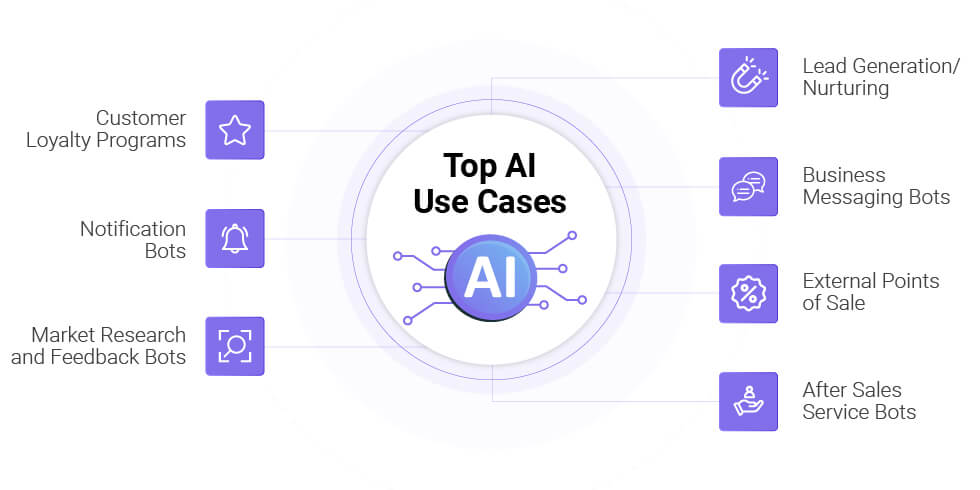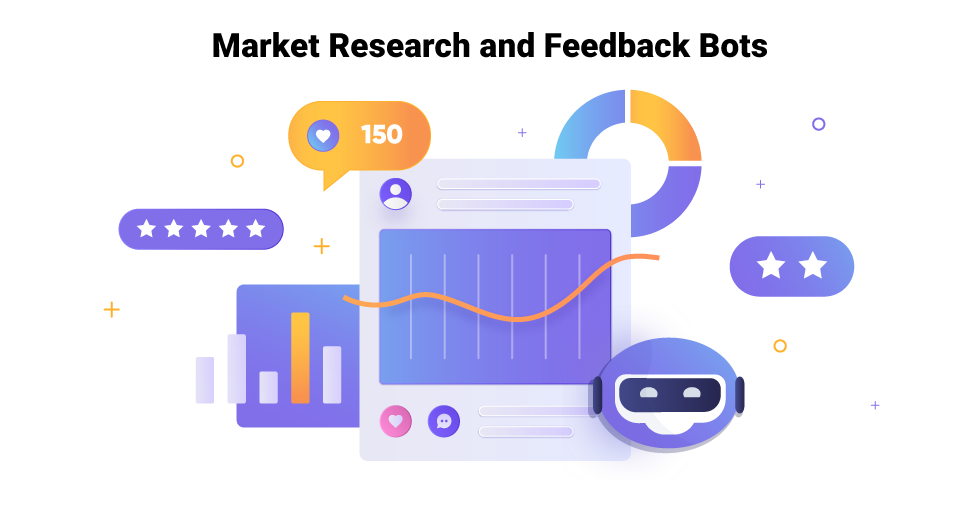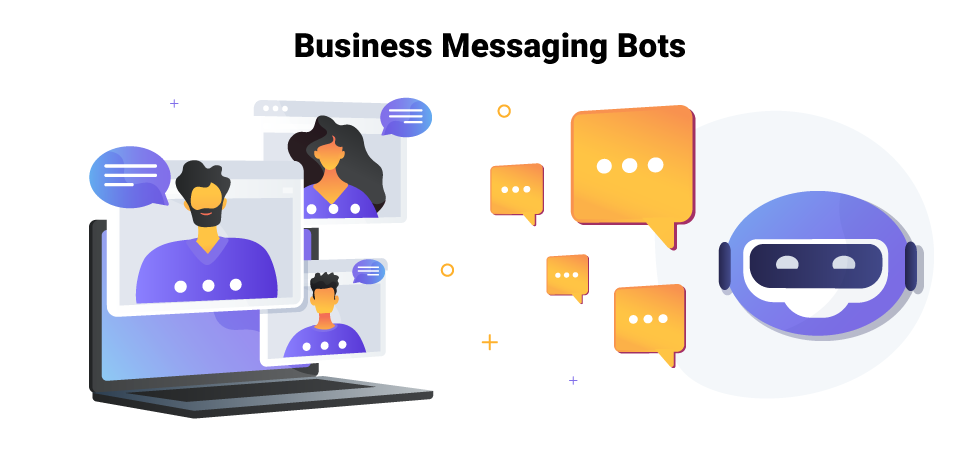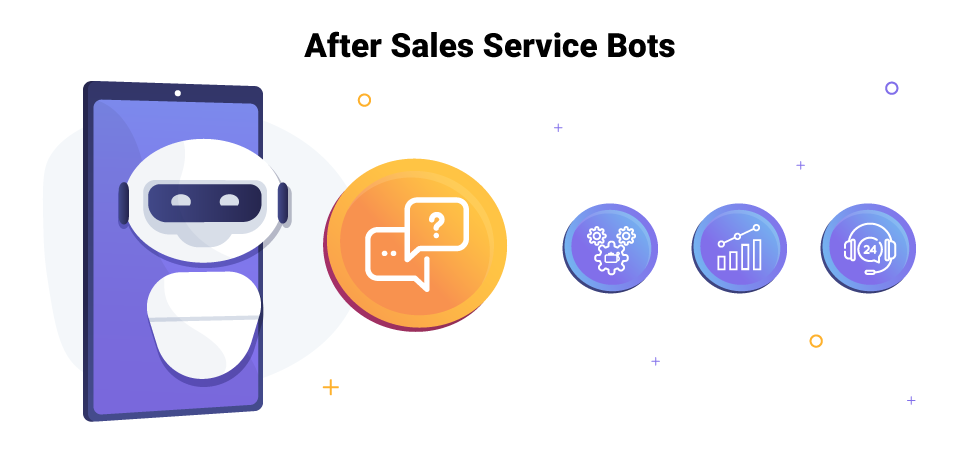Last year, we listed some of the best examples of chatbots in the eCommerce industry, and while 2022 may have gone by faster than other years, a lot still happened. There was a massive shift in consumer behavior and expectations that drive major eCommerce trends. As a result of this, chatbots, and conversational AI in eCommerce, in general, have become much more relevant in 2023. Conversational AI projects are no longer limited to just customer service and businesses are deploying them for numerous other tasks. In this article, we’ll take a look at some of the most popular conversational AI use cases in the eCommerce industry.

Table of Contents
Top Conversational AI and Chatbot Use Cases in eCommerce
Customer Loyalty Programs
The value of customer loyalty programs, coupled with the power of conversational AI for eCommerce, has long been documented by various publications and studies. For instance, in 2020, Harvard Business Review found that having strong customer loyalty can generate 2.5 times greater revenue than companies that don’t (in the same industry).
There are multiple AI chatbot examples of conversational tech in customer loyalty programs, including using chatbots to automate customer engagement. Consumers want to feel rewarded and acknowledged but doing this manually is impossible and automated CRM solutions are expensive. Chatbots are thus, a great option for engaging customers efficiently after certain triggers (such as making a purchase or adding products to the cart). Some ways of using chatbots to strengthen customer loyalty and drive engagement include:
- sending personalized messages after certain actions
- asking consumers to review previous purchases through an easy chat window
- allowing consumers to set price reminders using the chat window
Learn more about conversational AI in E-commerce.
Notification Bots
Many eCommerce companies offer an option to set up alerts for products that are out of order. However, that usually requires online shoppers to either create an account or at least submit their email addresses. Unfortunately, both of these options turn away a surprisingly large percentage of consumers. This is because mandatory sign-up is a major obstacle in modern eCommerce and leads to cart abandonment 31% of the time. Similarly, many online shoppers are wary of entering their email addresses on eCommerce websites they are not familiar with, mostly to avoid spam.
This is where Conversational commerce chatbots are better. They can be programmed to not only send notifications when a reserved product is back in stock but do so through popular messaging platforms such as Facebook Messenger and WhatsApp. Furthermore, chatbots can send a wide range of other notifications such as price alerts, shopping reminders, shipping delays, and order updates.
Additionally, notifications through email aren’t the best way to reach consumers in 2021. For one, younger shoppers are ditching email in favor of messaging apps such as Facebook and WhatsApp. Email also has a worse open rate than other communication channels such as push notifications (the kind used by chatbots) and SMS.
Market Research and Feedback Bots
Every year many companies including Master of Code publish their predictions for major industry trends like we did this year for the eCommerce industry. However, since these predictions cover the entire industry, there are bound to be deviations and exceptions between categories and genres. For instance, a few of the major post-COVID eCommerce trends for 2021 do not apply to the luxury goods market.

As a result, it’s important for businesses to gain insight into their target demographics and refine their offerings from time to time. Many businesses are now deploying Conversational AI in eCommerce projects for this very purpose – to learn about the market, directly from the customer.
These AI chatbots in eCommerce use natural speech to understand what the customer liked and disliked about their shopping experience with the store as well as how it can be improved. This is where conversation analytics services help businesses turn raw customer feedback into structured insights, revealing recurring pain points, sentiment shifts, and opportunities to optimize the shopping journey. Chatbots do a better job than conventional surveys and forms at getting this feedback because of three main reasons:
- feedback chatbots are deployed on messaging platforms and thus “chatting” for a few seconds isn’t an inconvenience
- chatbots are more personal/informal and less intimidating than many feedback forms and surveys.
- talking to an intelligent robot is engaging
Lead Generation/Nurturing
Conversational eCommerce chatbots are capable of parsing large data sets which means they can be used to automate cold outreach and lead generation. For instance, chatbots can use artificial intelligence to create segments within an audience (comprising of visitors, people who like, or view related content) and target these segments with different types of incentives. Some of the ways of chatbots can generate leads include:
- sending the user more content that is similar to the things they liked or watched in the past
- use location data to find nearest stores and send potential reservation times
- send marketing content to encourage action such as visiting a specifically designed landing page
Once a lead connects back, they became a warm lead and chatbots go into lead nurturing/management mode. Thanks to the natural speech capabilities of conversational AI, chatbots can continue the conversation and nurture leads by guiding them through the sales funnel until they are ready to convert. Some of the ways of chatbots can nurture leads include:
- giving personalized recommendations based on the lead’s likes and dislikes
- knowing when the potential customer is losing interest (one indicator is slow responses) and switch tactics
- sending coupons, rewards, and other discount offers
Business Messaging Bots
Conversational AI is becoming the de facto method of business messaging as the technology continues to grow towards that goal with the rise of messaging apps and platforms like Google RCS – both of which are great places to deploy AI chatbots.
Using conversational AI for business messaging depends on factors such as the messaging app used by the target demographics as the platforms have a big impact on the number of features that a chatbot can have. Similarly, how tech-savvy the users are, also has an impact. Younger online shoppers are more likely to use Google’s RCS messaging system which gives businesses the opportunity to build conversational AI chatbots for eCommerce on Android’s default SMS app and send interactive, rich-media messages.

Once deployed, the only major limitation is creativity. Chatbots can be used to announce sales and deals of the day, send order confirmation messages, coupons and other rewards, and more. But most important of all, AI chatbots give users the ability to take action of these incentives as well, which brings us to the sixth eCommerce use case of conversational AI.
External Points of Sale
One of the most dominant Conversational AI use cases in eCommerce is extending the convenience of online shopping from the website to popular messaging apps. Each chatbot can be designed to be a Point of Sale (PoS) in itself where consumers can complete the entire customer journey by having the ability to checkout without ever leaving the Messenger or any other chatbot window.
The value of this is especially evident in relatively low-cost and low-risk product categories such as pantry, take-out, groceries, clothing, etc. where the average cart value is low and thus consumers feel more comfortable in making purchases through chatbots. Chatbots can also be used for upselling and cross-selling as they can recommend products in a conversational manner with a brief explanation too.
Additionally, almost every eCommerce store has a dedicated mobile application but many consumers don’t like the clutter of having dozens of apps on their smartphones. As a result, eCommerce chatbots have become a more attractive and viable shopping platform.
After Sales Service Bots
As we said at the beginning of the article, customer service was one of the first conversational AI use cases in eCommerce and it continues to be a major AI use case in 2021 as well. After Sales Service is a major determining factor in repeated sales and customer retention. Consumers want immediate response and the vast majority of the time, their queries can be answered by a chatbot based on conversational AI.
There are other benefits to using chatbots for customer service as well including:
- reduced dependence on human staff
- customer support available 24/7
- scalability as AI chatbots are capable of processing upwards of millions of queries a day.

Future of Conversational AI in eCommerce
Global trends in the eCommerce industry in 2023 will be driven by personalization and efficient scaling. Coincidentally, Сonversational AI is a critical tool in offering highly scalable personalized service at very low costs. This combination makes conversational AI more useful than ever, which is evident by the growing chatbot & conversational use cases and creative AI projects in the industry.
Check out your potential cost savings by implementing a chatbot solution for customer supportCalculate ROI
If you’d like to learn more about how AI chatbots fit into your specific business model and how you can make the right changes for 2023, consult a Сonversational AI expert at Master of Code today.
Increase avg. weekly conversion in 7.67x with chatbot launch for your eCommerce solution.





